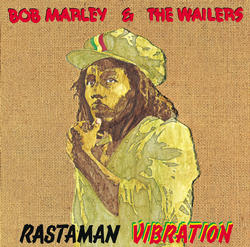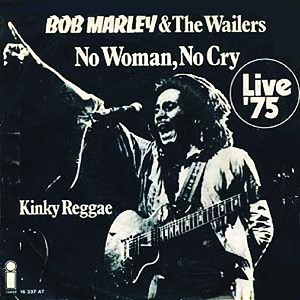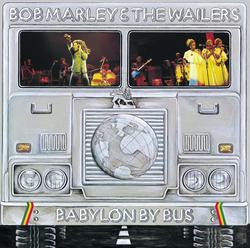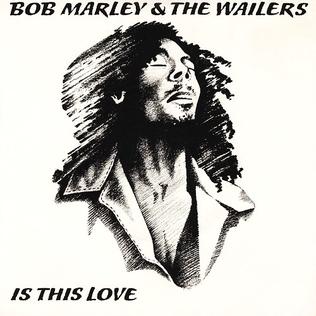
Exodus is the ninth studio album by Jamaican reggae band Bob Marley and the Wailers, first released in June 1977 through Island Records, following Rastaman Vibration (1976). The album's production has been characterized as laid-back with pulsating bass beats and an emphasis on piano, trumpet and guitar. Unlike previous albums from the band, Exodus thematically moves away from cryptic story-telling; instead it revolves around themes of change, religious politics, and sexuality. The album is split into two halves: the first half revolves around religious politics, while the second half is focused on themes of making love and keeping faith.

Catch a Fire is the fifth studio album by the reggae band The Wailers, released in April 1973. It was their first album released by Island Records. After finishing a UK tour with Johnny Nash, they had started laying down tracks for JAD Records when a disputed CBS contract with Danny Sims created tensions. The band did not have enough money to return to Jamaica, so their road manager Brent Clarke approached producer Chris Blackwell, who agreed to advance The Wailers money for an album. They instead used this money to pay their fares back home, where they completed the recordings that constitute Catch a Fire. The album has nine songs, two of which were written and composed by Peter Tosh; the remaining seven were by Bob Marley. While Bunny Wailer is not credited as a writer, the group's writing style was a collective process. For the immediate follow-up album, Burnin', also released in 1973, he contributed four songs. After Marley returned with the tapes to London, Blackwell reworked the tracks at Island Studios, with contributions by Muscle Shoals session musician Wayne Perkins, who played guitar on three overdubbed tracks. The album had a limited original release under the name The Wailers in a sleeve depicting a Zippo lighter, designed by graphic artists Rod Dyer and Bob Weiner; subsequent releases had an alternative cover designed by John Bonis, featuring an Esther Anderson portrait of Marley smoking a "spliff", and crediting the band as Bob Marley and the Wailers.

Rastaman Vibration is the eighth studio album by Jamaican reggae band Bob Marley and the Wailers, released in April 1976.

Kaya is the tenth studio album by the Jamaican band Bob Marley and the Wailers, released in 1978. The album consists of tracks recorded alongside those released on the Exodus album. It was produced by the band.

"No Woman, No Cry" is a reggae song by Bob Marley and the Wailers. The song was recorded in 1974 and released on the studio album Natty Dread.

Bob Marley and the Wailers were a Jamaican ska, rocksteady and reggae band. The founding members, in 1963, were Bob Marley, Peter Tosh, and Bunny Wailer.

Stephen Robert Nesta Marley is a Jamaican-American musician. The son of Bob Marley, Marley is an eight-time Grammy Award winner, three times as a solo artist, twice as a producer of younger brother Damian Marley's Halfway Tree and Welcome to Jamrock albums, and a further three times as a member of his older brother Ziggy Marley's group Ziggy Marley & The Melody Makers.

Babylon by Bus is a live album released by Bob Marley and the Wailers in 1978. The tracks on this album are considered, with two exceptions, to be from the Pavillon de Paris concerts over 3 nights, 25–27 June 1978, during the Kaya Tour, though there are discrepancies in the track listing.

Legend is a compilation album by Bob Marley and the Wailers. It was released in May 1984 by Island Records. It is a greatest hits collection of singles in its original vinyl format and is the best-selling reggae album of all-time, with over 12 million sold in the US, over 3.3 million in the UK and an estimated 25 million copies sold globally. In 2003, the album was ranked number 46 in Rolling Stone magazine's list of the "500 Greatest Albums of All Time", maintaining the ranking in a 2012 revised list, but dropping to number 48 in the 2020 revised list.

Most of Bob Marley's early music was recorded with Peter Tosh and Bunny Wailer, who together with Marley were the most prominent members of the Wailers. In 1972, the Wailers had their first hit outside Jamaica when Johnny Nash covered their song "Stir It Up", which became a UK hit. The 1973 album Catch a Fire was released worldwide, and sold well. It was followed by Burnin', which included the song "I Shot the Sheriff". Eric Clapton's cover of the song became a hit in 1974.

"Is This Love" is a song by Bob Marley and the Wailers, released on their 1978 album Kaya. The song became one of the best-known Marley songs and was part of the Legend compilation. It peaked at number 9 in the UK charts upon its release in 1978. A live rendition of the song can be found on the Babylon by Bus live album from Paris in 1978.

"Three Little Birds" is a song by Bob Marley and the Wailers. It is the fourth track on side two of their 1977 album Exodus and was released as a single in 1980. The song reached the Top 20 in the UK, peaking at number 17. It is one of Marley's most popular songs and has been covered by numerous other artists. The song is often thought to be named "Don't Worry About a Thing" or "Every Little Thing is Gonna Be Alright", because of the prominent and repeated use of these phrases in the chorus.
"One Love" is a ska song written by Bob Marley and recorded by his group the Wailers from their 1965 debut studio album The Wailing Wailers. It was rerecorded as part of the 1970 medley "All in One", which contained reggae reworkings of their early ska songs. This was released as a single and is also included on the compilation African Herbsman under the name "All in One".

Robert Nesta Marley was a Jamaican reggae singer, guitarist, and songwriter. Considered one of the pioneers of the genre, Marley fused elements of reggae, ska, and rocksteady in his music and was renowned for his distinctive vocal and songwriting style. Marley's contribution to music increased the visibility of Jamaican music worldwide and made him a global figure in popular culture. Over the course of his career, Marley became known as a Rastafarian icon, and he infused his music with a sense of spirituality. He is also considered a global symbol of Jamaican music and culture and identity, and was controversial in his outspoken support for democratic social reforms. He also supported legalisation of cannabis, and advocated for Pan-Africanism. In 1976, Marley survived an assassination attempt in his home, which was thought to be politically motivated.

"Waiting in Vain" is a song written by reggae musician Bob Marley and recorded by Bob Marley and the Wailers, for their 1977 album Exodus. Released as a single, it reached number 27 on the UK Singles Chart.

"Could You Be Loved" is a 1980 song by Jamaican reggae band Bob Marley and the Wailers. It was released as the first single from their twelfth and last album, Uprising (1980), and is also included on their greatest-hits album Legend (1984). It was written in 1979 on an aeroplane while The Wailers were experimenting on guitar. In the middle of the song, background singers quote a verse from Bob Marley's first single "Judge Not": "The road of life is rocky; And you may stumble too. So while you point your fingers, someone else is judging you". Instruments used on the original record of this song are guitars, bass, drums, acoustic piano, the Hohner clavinet and an organ, as well as the Brazilian cuíca. "Could You be Loved" was very successful on the charts in Europe, peaking within the top 10 in Belgium, France, Ireland, Italy, the Netherlands, Norway, Spain, Switzerland and the UK. Additionally, it was a top 20 hit in Sweden and West Germany.

One Love: The Very Best of Bob Marley & The Wailers is a compilation album of Bob Marley and the Wailers songs that was released on the Island Records label in 2001.

Neville O'Riley Livingston, known professionally as Bunny Wailer, was a Jamaican singer-songwriter and percussionist. He was an original member of reggae group The Wailers along with Bob Marley and Peter Tosh. A three-time Grammy Award winner, he is considered one of the longtime standard-bearers of reggae music. He was also known as Jah B, Bunny O'Riley, and Bunny Livingston.

Welcome to Jamrock is the third studio album by Jamaican reggae/dancehall artist Damian "Jr. Gong" Marley. The album was released on September 12, 2005, in the United Kingdom, and one day later in the United States.

"Guava Jelly" is a song recorded by the Jamaican group Bob Marley and the Wailers. It was released as a 7" vinyl single through Tuff Gong and Green Door Records. It was issued commercially with B-side track "Redder Then Red", which was misspelled on its initial printing, in 1971. It was written and produced by Marley and features uncredited lyrical contributions from Bunny Livingston. A reggae composition like the majority of Marley's works, "Guava Jelly" contains a rocksteady and island-like production with lyrics loosely based around sexual intercourse. His use of the term "guava jelly" was likely referring to a specific type of sexual lubricant. It was favorably viewed by several reviewers, with many of them finding the composition to be sexual and about love. The group placed "Guava Jelly" on several compilation albums, including Africa Unite: The Singles Collection in 2005, and Owen Gray and Herbie Mann created their own versions in 1974 and 1975, respectively.



















